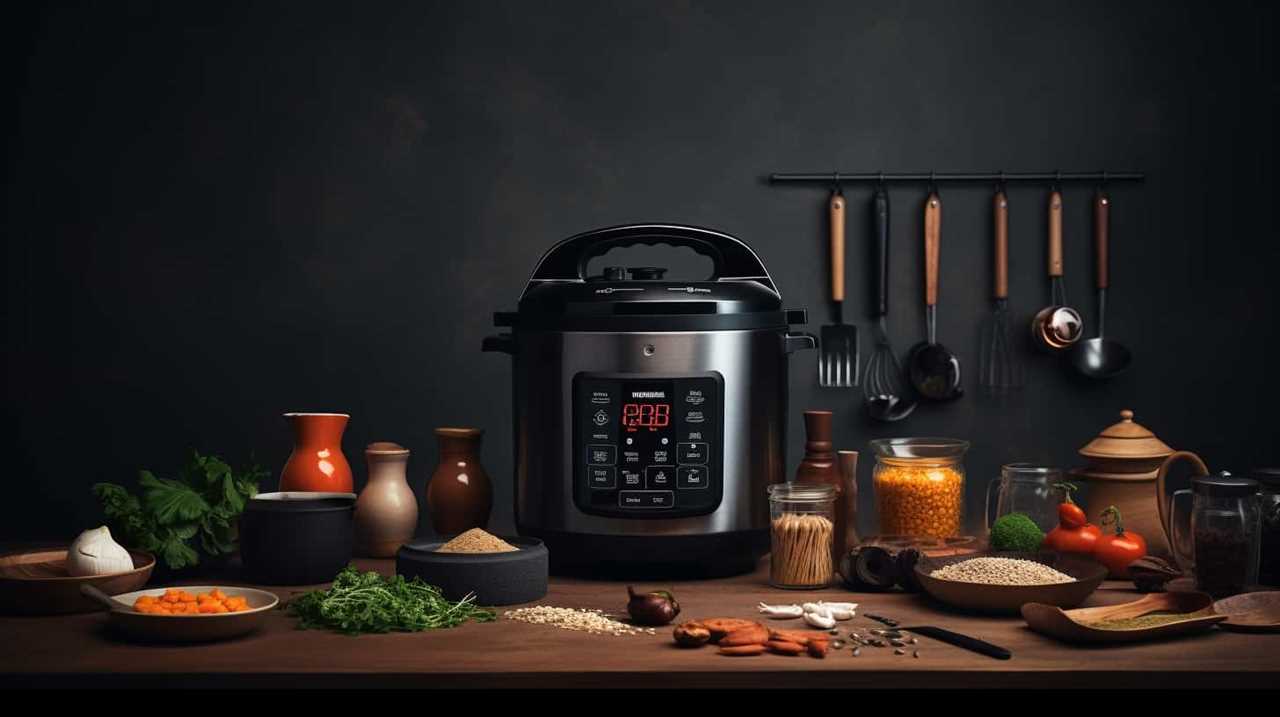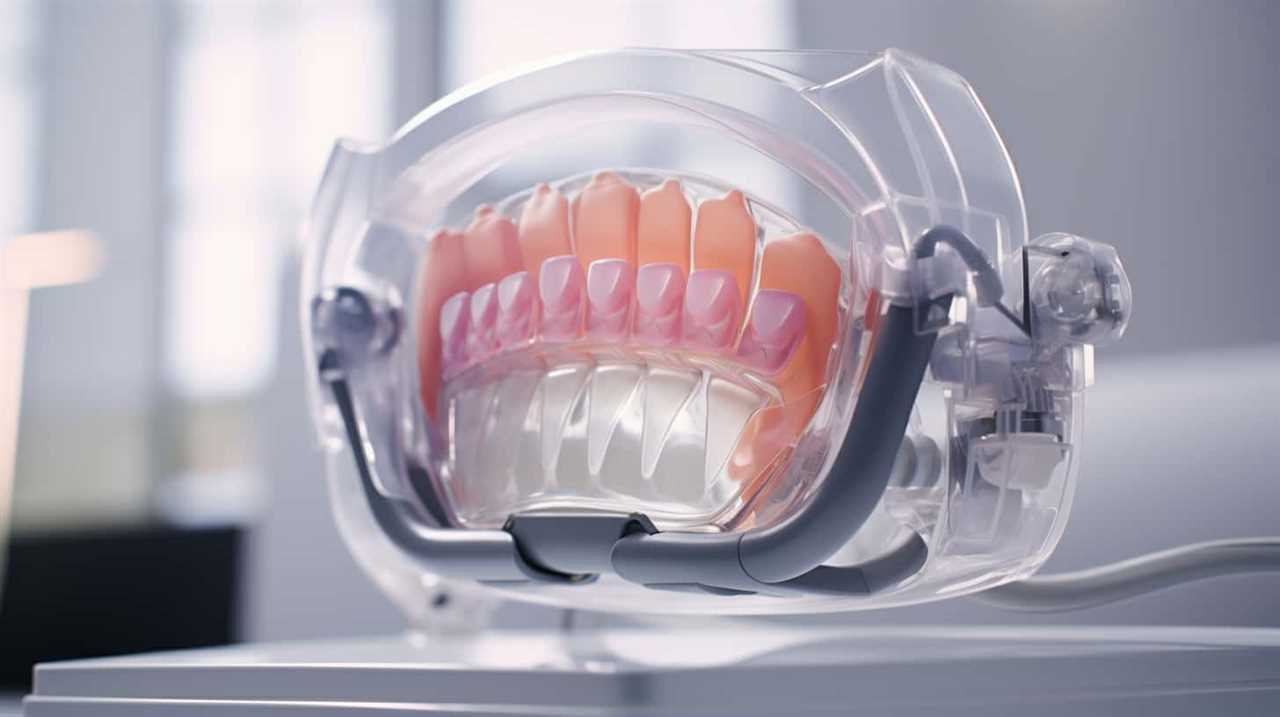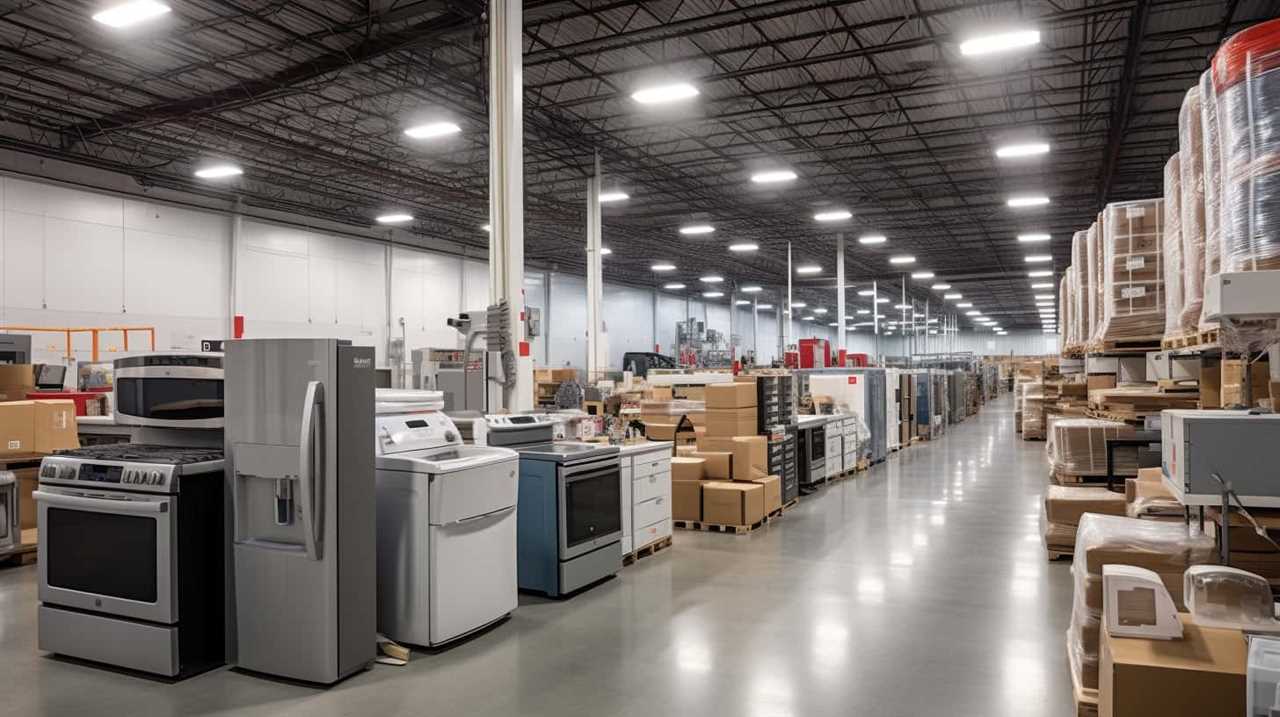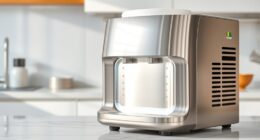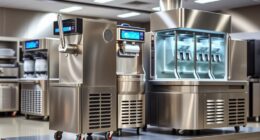Welcome to our guide on how to optimize efficiency using innovative refrigerator technologies!
In this comprehensive resource, we will explore the latest advancements in refrigerator technology that can help you achieve mastery over energy consumption and optimize the performance of your fridge.
From smart refrigerators with energy-saving features to cutting-edge cooling systems and energy-efficient compressor technologies, we will delve into the world of state-of-the-art appliances designed to minimize waste and maximize efficiency.
By utilizing advanced insulation materials, temperature control mechanisms, and integrated water and ice dispensers with energy-saving options, you can effortlessly reduce your carbon footprint while enjoying the convenience of a modern refrigerator.

With automated inventory tracking, food waste reduction, and Wi-Fi connectivity for remote control and monitoring, you can be in complete control of your refrigerator’s energy usage.
Let’s embark on this journey towards a more efficient and sustainable future together!
Key Takeaways
- Smart refrigerators integrate advanced technologies such as sensors and adaptive defrost to optimize energy usage and prevent waste.
- Energy-efficient compressor technologies, such as variable speed compressors and inverter compressors, provide high energy efficiency and superior cooling performance.
- Regular cleaning and maintenance, along with proper insulation, contribute to energy efficiency and prolong the lifespan of refrigerators.
- Integration of renewable energy sources, such as solar power and wind power, reduces energy consumption and promotes sustainability in refrigerators.
Smart Refrigerators With Energy-Saving Features
We have found that smart refrigerators with energy-saving features can significantly reduce electricity consumption. These innovative appliances are designed to integrate seamlessly into smart homes, allowing homeowners to control and monitor their refrigerator’s settings remotely. By utilizing advanced technologies such as sensors, adaptive defrost, and high-efficiency compressors, these refrigerators optimize energy usage while maintaining optimal food storage conditions.
One key feature of smart refrigerators is their ability to adjust cooling settings based on real-time data. For example, if the refrigerator door is frequently opened, the appliance will detect this and adjust the temperature accordingly to prevent unnecessary energy waste. Additionally, smart refrigerators can learn from user behavior, adapting their cooling patterns based on usage patterns and preferences.

Furthermore, sustainable design is a crucial aspect of these smart refrigerators. Manufacturers prioritize energy efficiency, using materials and components that minimize environmental impact. Many smart refrigerators also offer features like vacation mode, which reduces energy consumption when the homeowner is away for an extended period.
Innovative Cooling Systems for Maximum Efficiency
How can refrigerators achieve maximum efficiency through innovative cooling systems? One key feature that contributes to this efficiency is smart temperature control. Smart temperature control systems utilize advanced sensors and algorithms to monitor and adjust the temperature inside the refrigerator, ensuring that it stays within the optimal range for food preservation while minimizing energy consumption.
These systems are designed to detect changes in temperature and make real-time adjustments to maintain the desired conditions. By constantly monitoring the internal temperature and adjusting cooling accordingly, smart temperature control systems prevent unnecessary energy usage and reduce fluctuations in temperature, which can lead to food spoilage.
In addition to maintaining precise temperature control, innovative cooling systems also incorporate improved insulation materials and design techniques to minimize heat transfer. This helps to reduce the load on the cooling system and improve overall energy efficiency.

By combining smart temperature control with enhanced insulation, refrigerators can achieve maximum efficiency by minimizing energy consumption while still ensuring optimal food storage conditions. This not only reduces electricity bills but also helps to reduce the environmental impact of refrigeration.
With the importance of energy efficiency in mind, let’s now explore the next section, which focuses on energy-efficient compressor technologies.
Energy-Efficient Compressor Technologies
To further enhance the efficiency of refrigerators, incorporating energy-efficient compressor technologies is crucial. Compressors are an essential component of refrigerators, responsible for circulating refrigerant and maintaining the desired temperature inside the unit. Energy-efficient compressor technologies aim to reduce energy consumption and improve overall performance, leading to cost savings and environmental benefits.
One of the most notable advancements in energy-efficient compressor technologies is the variable speed compressor. Unlike traditional compressors that operate at a fixed speed, variable speed compressors can adjust their speed based on cooling needs, resulting in significant energy savings. This technology allows the compressor to run at lower speeds during periods of low demand, reducing energy consumption without compromising cooling performance.

Another innovative energy-efficient compressor technology is the use of inverter compressors. Inverter compressors have the ability to adjust the power supply frequency, allowing for precise control of the compressor’s speed. This enables the compressor to operate at optimal levels, reducing energy wastage and improving overall efficiency.
To illustrate the benefits of energy-efficient compressor technologies, let’s take a look at the following table:
| Compressor Technology | Energy Efficiency | Cooling Performance |
|---|---|---|
| Variable Speed | High | Optimal |
| Inverter | Excellent | Superior |
By incorporating these energy-efficient compressor technologies into refrigerators, manufacturers can offer appliances that not only consume less energy but also provide superior cooling performance. This is particularly important in today’s world, where energy conservation and sustainability are paramount.
To maximize the benefits of energy-efficient compressor technologies, it is also essential to implement energy-efficient maintenance techniques. Regular cleaning and maintenance of compressor coils, proper insulation, and timely repairs can further enhance the efficiency of refrigerators, prolong their lifespan, and reduce energy consumption.

Additionally, the integration of renewable energy sources, such as solar or wind power, can further reduce the environmental impact of refrigerators. By utilizing clean and sustainable energy, refrigerators can operate more efficiently and contribute to a greener future.
Advanced Insulation Materials for Improved Efficiency
When it comes to maximizing efficiency in refrigerators, advanced insulation materials play a crucial role. These energy-saving insulation materials are designed to enhance the cooling performance of refrigerators by reducing heat transfer and minimizing energy loss.
Energy-Saving Insulation Materials
We are able to maximize the efficiency of refrigerators by using advanced insulation materials that help improve energy-saving capabilities. Energy efficient building materials play a crucial role in reducing energy consumption and promoting sustainability.
Sustainable insulation options, such as recycled cellulose, sheep’s wool, or aerogel, offer superior thermal performance compared to traditional insulation materials. These advanced materials have low thermal conductivity, which minimizes heat transfer and reduces the workload on the refrigerator’s cooling system. Additionally, they have high moisture resistance properties, preventing the growth of mold or mildew.

Enhanced Cooling Performance
Our continued exploration of advanced insulation materials for refrigerators leads us to the topic of enhanced cooling performance. To achieve this, manufacturers have incorporated smart temperature control devices and improved cooling technology.
Here are three key advancements:
- Enhanced Air Circulation: Refrigerators now utilize advanced fans and vents to ensure optimal airflow. This promotes even cooling throughout the entire refrigerator, preventing hotspots and maintaining consistent temperatures.
- Intelligent Temperature Control: Smart temperature control devices have been integrated into modern refrigerators. These devices use sensors to monitor and adjust the temperature settings automatically. This not only ensures precise cooling but also improves energy efficiency by avoiding unnecessary cooling cycles.
- Advanced Cooling Technology: Refrigerators now employ advanced cooling systems, such as multi-airflow systems and variable speed compressors. These technologies optimize cooling efficiency while minimizing energy consumption.
With these innovations, refrigerators can now achieve enhanced cooling performance, maintaining food freshness and reducing energy consumption for a more efficient and sustainable experience.
Cutting-Edge Temperature Control Mechanisms
Our discussion on cutting-edge temperature control mechanisms begins with a focus on smart sensors and their role in optimizing refrigerator efficiency. These sensors continuously monitor the temperature inside the refrigerator and make real-time adjustments to ensure optimal cooling while minimizing energy consumption.

By accurately detecting temperature variations and adjusting cooling levels accordingly, smart sensors help maintain food freshness and reduce energy wastage.
This innovative technology is just one of the energy-saving cooling advancements that are transforming the refrigeration industry.
Smart Sensors Optimize Temperature
Smart sensors play a crucial role in optimizing temperature control mechanisms in refrigerators, allowing for precise and efficient operation. These innovative sensors utilize advanced technology to ensure that food remains at optimal freshness and quality.
Here are three key ways in which smart sensors enhance temperature control in refrigerators:

- Food freshness monitoring: Smart sensors constantly monitor the temperature inside the refrigerator, ensuring that perishable items are kept at the ideal temperature to maintain their freshness for longer periods.
- Temperature-controlled compartments: With the help of smart sensors, refrigerators can create separate compartments with different temperature settings. This allows for precise control over the temperature of various food items, ensuring they’re stored at their optimal conditions.
- Adaptive temperature adjustments: Smart sensors can detect changes in the external environment and adjust the refrigerator’s temperature accordingly. This adaptive feature helps maintain a consistent temperature inside the refrigerator, preventing temperature fluctuations that can negatively impact food quality.
By harnessing the power of smart sensors, refrigerators can optimize temperature control and provide an ideal environment for different food items.
Transitioning into the subsequent section about ‘energy-saving cooling advancements’, we’ll explore how these innovations further enhance refrigerator efficiency.
Energy-Saving Cooling Advancements
To maximize efficiency in refrigerators, we can explore energy-saving cooling advancements that utilize cutting-edge temperature control mechanisms. These advancements not only help reduce energy consumption but also contribute to a greener environment by using eco-friendly refrigerants. One such advancement is the implementation of smart temperature control systems. These systems use advanced sensors and algorithms to constantly monitor and adjust the temperature inside the refrigerator, ensuring optimal cooling while minimizing energy waste. By intelligently adapting to usage patterns and external conditions, smart temperature control systems can achieve significant energy savings without compromising food safety. Additionally, manufacturers are increasingly adopting eco-friendly refrigerants, such as hydrofluoroolefins (HFOs) and hydrocarbons, which have lower global warming potential and ozone depletion potential compared to traditional refrigerants. Incorporating these energy-saving cooling advancements into refrigerators allows for a more efficient and environmentally friendly cooling solution.
| Advancement | Description | Benefits |
|---|---|---|
| Smart Temperature Control | Utilizes sensors and algorithms to monitor and adjust temperature for optimal cooling and energy savings. | Energy efficiency, food safety |
| Eco-Friendly Refrigerants | Adoption of refrigerants with lower global warming potential and ozone depletion potential. | Environmental friendliness, safety |
| Cutting-Edge Temperature Control Mechanisms | Advanced temperature control mechanisms that maximize efficiency and minimize energy waste. | Energy savings, enhanced performance |
Eco-Friendly Refrigerants for Reduced Environmental Impact
In recent years, manufacturers have made significant strides in developing and implementing eco-friendly refrigerants that have a reduced environmental impact. These eco-friendly refrigerant alternatives are part of sustainable cooling technologies that aim to minimize the negative effects of traditional refrigerants on the environment.

Here are three key developments in this area:
- Hydrofluoroolefin (HFO) Refrigerants: HFO refrigerants are a new generation of refrigerants that have a lower global warming potential (GWP) compared to their predecessors. These refrigerants have zero ozone depletion potential (ODP) and are designed to provide efficient cooling without contributing to climate change.
- Natural Refrigerants: Natural refrigerants, such as carbon dioxide (CO2), ammonia (NH3), and hydrocarbons (HCs), are gaining popularity due to their low environmental impact. These refrigerants have zero or very low GWP and ODP, making them a sustainable choice for cooling applications.
- Refrigerant Reclamation and Recycling: To reduce the environmental impact of refrigerants, manufacturers are implementing systems for reclaiming and recycling these substances. This process involves safely collecting and treating used refrigerants, allowing them to be reused or properly disposed of, reducing emissions and minimizing waste.
Enhanced Airflow Systems for Better Circulation
One key feature that enhances the efficiency of refrigeration systems is the implementation of improved airflow systems for better circulation. These systems are designed to optimize air circulation within the refrigerator, ensuring that cool air is distributed evenly throughout the storage compartments. By improving ventilation techniques, manufacturers are able to create a more efficient cooling process that reduces energy consumption and improves overall performance.
Improved ventilation techniques involve the use of strategically placed vents and fans within the refrigerator. These components work together to create a steady flow of air, preventing hot spots and ensuring that cold air reaches every corner of the unit. This not only keeps food fresh for longer periods but also reduces the risk of temperature fluctuations that can lead to spoilage.
Optimized air circulation also improves the refrigerator’s ability to maintain consistent temperatures. When cold air is evenly distributed, the cooling system doesn’t have to work as hard to reach the desired temperature, resulting in energy savings. Additionally, the enhanced airflow minimizes the amount of moisture in the refrigerator, reducing the formation of frost and ice, which can hinder cooling efficiency.

Intelligent Defrosting and De-Icing Functions
Our refrigerators are equipped with intelligent defrosting and de-icing functions, which enhance efficiency and ensure optimal performance. These smart defrosting features are designed to prevent ice buildup, allowing our refrigerators to operate at their best.
Here are three key aspects of our intelligent defrosting and de-icing functions:
- Adaptive Defrost: Our refrigerators utilize advanced algorithms to determine the optimal time for defrosting. By monitoring factors such as temperature, humidity, and usage patterns, the system intelligently adjusts the defrosting cycle to minimize energy consumption while effectively removing any ice buildup.
- Quick Defrost: In situations where you need to quickly defrost a specific compartment, our refrigerators offer a quick defrost option. This feature uses a combination of controlled temperature and airflow to speed up the defrosting process, saving you time and ensuring your food stays fresh.
- Frost-Free Technology: Our refrigerators incorporate frost-free technology, which eliminates the need for manual defrosting. This technology constantly circulates air within the freezer compartment, preventing ice from forming in the first place. Say goodbye to the hassle of regular defrosting!
With these intelligent defrosting and de-icing functions, our refrigerators not only maintain optimal performance but also reduce energy consumption and improve the overall lifespan of your appliance.
Now, let’s move on to exploring optimal storage configurations for space utilization.

Optimal Storage Configurations for Space Utilization
When it comes to maximizing the space in your refrigerator, efficient shelving solutions and space-saving organization tips are essential.
By utilizing adjustable shelves, door bins, and drawers, you can customize the storage configurations to accommodate various sizes and shapes of food items.
This not only optimizes the space available but also allows for easy access and visibility of the contents, reducing the need to search for items and minimizing food waste.
Space-Saving Organization Tips
In the quest for maximizing efficiency in our refrigerators, it’s essential to consider space-saving organization tips that optimize storage configurations. Here are three creative organization techniques that can help you make the most of your fridge space:

- Utilize adjustable shelves: Adjustable shelves allow you to customize the height of each shelf to accommodate items of different sizes. This ensures efficient utilization of vertical space and prevents wasted empty spaces.
- Use storage bins and containers: Investing in space-saving storage solutions such as clear bins and containers can help you group similar items together, making them easier to find and maximizing available space.
- Optimize door storage: The doors of your refrigerator are often underutilized areas. Consider adding door-mounted storage solutions such as racks or pockets to store condiments, small jars, and other frequently used items.
By implementing these space-saving organization tips, you can create a well-organized refrigerator that maximizes storage capacity and ensures easy access to all your food items.
Now, let’s explore efficient shelving solutions to further enhance the efficiency of your refrigerator.
Efficient Shelving Solutions
Let’s explore efficient shelving solutions that optimize storage configurations and maximize space utilization in our refrigerators. Efficient shelving design is crucial for organizing food items and maximizing the available space within the refrigerator.
Adjustable storage solutions offer flexibility and allow users to customize the shelving configurations according to their needs. These solutions typically feature adjustable shelves, removable dividers, and sliding drawers that can be rearranged to accommodate items of various sizes and shapes.

Integrated Water and Ice Dispensers With Energy-Saving Options
We can optimize energy consumption by utilizing integrated water and ice dispensers with energy-saving features. These innovative technologies not only provide convenience but also help reduce electricity usage. Here are three ways these dispensers contribute to energy efficiency:
- Energy Efficient Water Filtration Systems:
Integrated water and ice dispensers often come equipped with advanced filtration systems. These systems ensure that the water and ice produced are clean and safe to consume. Energy-efficient filters are designed to minimize energy consumption without compromising the filtration quality. By using less power, these systems help reduce the overall energy consumption of the refrigerator. - Smart Ice Making Technologies:
Integrated ice dispensers now feature smart technologies that optimize ice production. These technologies use sensors to detect the ice levels in the storage bin and adjust the ice-making process accordingly. By efficiently managing ice production, these systems prevent unnecessary energy wastage. They also ensure that the ice maker operates only when needed, reducing energy consumption. - Energy-Saving Options:
Many integrated water and ice dispensers offer energy-saving modes. These modes allow users to adjust the dispenser’s settings to conserve energy. For example, a user can set a timer to automatically turn off the dispenser after a certain period of inactivity. This feature helps save energy by preventing the dispenser from running continuously when not in use.
Energy Monitoring and Management Capabilities
To further enhance energy efficiency, our refrigerators now come equipped with advanced energy monitoring and management capabilities. These features allow for precise energy consumption analysis and real-time power monitoring, enabling users to have a clear understanding of how much energy their refrigerator is consuming at any given time. By providing this valuable information, our refrigerators empower users to make informed decisions about their energy usage and take steps to reduce their environmental impact.
Energy consumption analysis allows users to track and analyze their refrigerator’s energy usage over time. This data can help identify patterns and trends, making it easier to identify opportunities for energy savings. Real-time power monitoring provides users with up-to-the-minute information on their refrigerator’s power consumption. This feature allows users to see the immediate impact of changes they make, such as adjusting temperature settings or switching to energy-saving modes.
By incorporating energy monitoring and management capabilities into our refrigerators, we’re enabling our users to actively participate in energy conservation efforts. With this information at their fingertips, they can make conscious choices that not only reduce their energy bills but also contribute to a more sustainable future.

In the next section, we’ll discuss the benefits of automated inventory tracking and how it can help reduce food waste.
Automated Inventory Tracking and Food Waste Reduction
Our automated inventory tracking system ensures efficient management of food supplies, reducing waste and maximizing freshness.
With automated meal planning, our refrigerator technology takes the guesswork out of meal preparation by suggesting recipes based on the ingredients available. This feature allows users to plan meals in advance and make the most of their food supplies, minimizing the risk of ingredients going unused and eventually becoming waste.
In addition, our smart expiration date reminders play a crucial role in reducing food waste. The system keeps track of the expiration dates of all items stored in the refrigerator and sends notifications when an item is nearing its expiration date. This ensures that users are aware of the items that need to be consumed or used before they spoil, preventing unnecessary waste.

Furthermore, our automated inventory tracking system provides real-time updates on the quantity and availability of each item. This enables users to plan their grocery shopping efficiently, avoiding over-purchasing or forgetting essential items. By maintaining an accurate inventory, users can reduce the likelihood of food going bad or expiring before it can be used.
Wi-Fi Connectivity for Remote Control and Monitoring
With Wi-Fi connectivity, users can remotely control and monitor their refrigerators for optimal convenience and efficiency.
Smart home integration allows users to connect their refrigerators to their home network, enabling them to access and control various features from their smartphones or other devices.
One of the key benefits of Wi-Fi connectivity is remote temperature control. Users can adjust the temperature settings of their refrigerators even when they’re away from home, ensuring that their food stays fresh and safe. This feature is particularly useful when users want to lower the temperature to quickly chill beverages or freeze items before their arrival.

Additionally, remote monitoring allows users to keep track of their refrigerator’s performance and receive alerts if there are any issues, such as a power outage or a door left open. This enables users to take immediate action and prevent food spoilage or energy waste.
Wi-Fi connectivity for remote control and monitoring offers a new level of convenience and efficiency, providing users with peace of mind and ensuring the optimal functioning of their refrigerators.
Frequently Asked Questions
How Does a Smart Refrigerator With Energy-Saving Features Reduce Energy Consumption?
Smart refrigerator features and energy-saving techniques work together to reduce energy consumption. By utilizing advanced technologies such as temperature sensors and adaptive defrosting, smart refrigerators can optimize energy usage based on real-time conditions.
These refrigerators also incorporate insulation improvements and efficient compressors, further reducing energy waste. Additionally, smart features like automated door closing and energy usage monitoring help users make informed decisions to minimize energy usage.

What Are Some Examples of Innovative Cooling Systems Used in Refrigerators for Maximum Efficiency?
Some examples of innovative cooling systems used in refrigerators for maximum efficiency include:
- Smart sensors: These sensors are able to detect the temperature inside the refrigerator and adjust the cooling accordingly, helping to reduce energy consumption.
- Magnetic cooling: This technology utilizes magnetic fields to create a cooling effect, eliminating the need for traditional refrigerants and further enhancing energy efficiency.
These technologies are just some of the ways that manufacturers are striving to maximize efficiency in refrigerators.
How Do Energy-Efficient Compressor Technologies Contribute to Reducing Energy Consumption in Refrigerators?
Energy-efficient compressor technologies play a crucial role in reducing energy consumption in refrigerators. By utilizing advanced compressor designs and innovative control systems, these technologies optimize the cooling process and minimize energy waste.
Smart refrigerators equipped with energy-saving compressor technologies can adjust cooling levels based on real-time usage, ensuring optimal energy efficiency. These advancements contribute to lower electricity bills and a reduced environmental impact, making them an essential component of modern, energy-efficient refrigeration systems.

What Are the Benefits of Using Advanced Insulation Materials in Refrigerators to Improve Efficiency?
Using advanced insulation materials in refrigerators has several benefits.
Firstly, it helps to improve energy efficiency by reducing heat transfer and minimizing energy waste.
Secondly, it enhances temperature regulation, ensuring food stays fresher for longer.
Lastly, it contributes to noise reduction, creating a quieter and more pleasant environment in the kitchen.

When comparing insulation materials, factors such as thermal conductivity, thickness, and cost should be considered.
How Do Cutting-Edge Temperature Control Mechanisms in Refrigerators Help Optimize Energy Usage?
Smart sensors and cutting-edge temperature control mechanisms in refrigerators play a crucial role in optimizing energy usage. By constantly monitoring and adjusting the temperature, these technologies ensure that the refrigerator operates at the most efficient level.
The smart sensors detect changes in temperature and adjust the cooling accordingly, while the energy management system regulates the compressor’s operation to minimize energy consumption. This combination of advanced technologies allows for precise and efficient control of energy usage, resulting in significant energy savings.
Conclusion
In conclusion, with the advent of innovative refrigerator technologies, we’ve unlocked the door to a world of enhanced efficiency.

These smart refrigerators, equipped with energy-saving features and advanced cooling systems, are like the diligent conductors of an orchestra, orchestrating the perfect balance between functionality and energy conservation.
From energy-efficient compressor technologies to cutting-edge temperature control mechanisms, these appliances are paving the way for a more sustainable future in the world of refrigeration.




